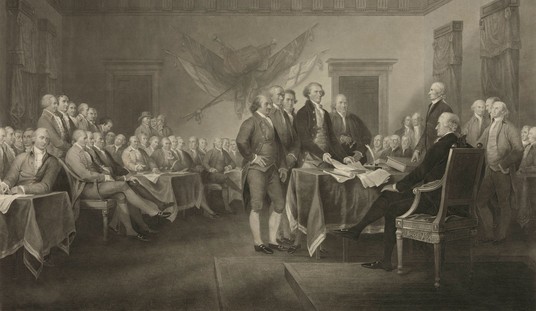When President Trump signed and proclaimed another welcome Executive Order on April 23, it elicited obligatory squeals from the formerly privileged beneficiaries of racial discrimination, but it went largely unnoticed.
While there's just too much happening in the vineyard of higher education reform to follow all of the good news, and it's easy to lose track, let's not let this one pass by without due genuflection, because it's a whopper that has potential to dramatically reform higher education and unleash productivity in American business as well.
The Executive Order titled “Restoring Equality of Opportunity and Meritocracy” eliminates the toxic doctrine of "disparate impact," which has bludgeoned both business and higher education for decades.
The key passage of the order is here:
“Disparate-impact liability is wholly inconsistent with the Constitution and threatens the commitment to merit and equality of opportunity that forms the foundation of the American Dream. Under my Administration, citizens will be treated equally before the law and as individuals, not consigned to a certain fate based on their immutable characteristics.”
The contrived legal gymnastics of "disparate impact" declares that if a race-neutral or sex-neutral policy yields an aggregate result that is deficient in some way in proportionality from what political policy preferences say should be the result, then that policy can be judged illegal racial discrimination.
Essentially, it permits an individual person to argue that he's been "harmed" by racial discrimination if a group to which he belongs doesn't demonstrate the desired proportional representation in a college or business, for example, and can sue them when they are innocent of wrongdoing. In effect, it compels the colleges to pursue racial discrimination to achieve the proper engineered mix to prevent legal action.
Recommended
You're correct if you understand this to put incredible power into the hands of those who create the categories and who determine that "desired proportional representation." Now, I'm not a lawyer, but my lawyer friends tell me that this has always been a shady set-up, legally speaking.
I am, however, a social scientist, and this "disparate impact" demonstrates what we call the "ecological fallacy."
This well-known fallacy is committed when data at the group level is used to draw conclusions at the individual level. Examples are abundant on the internet. They are simple and easy to understand. In fact, here is a list of 15 ecological fallacies to make the point.
This fallacy is especially acute when the "group" in question isn't really a "group" that is consciously formed by individuals joining together in common cause but rather is an arbitrary statistical category of persons who, in the case of higher education, have self-selected into the university. The "group" in question is thus the product of social engineers, who then impose their policy preferences on the school.
Under the regime of "disparate impact," individual persons are evaluated not by their actual performance according to race-blind or gender-blind policies, but by what the social engineers declare the reality ought to be. If the outcome does not match the policy prescription of the social engineers, then voila, we have illegal racial discrimination at the individual level. No other explanation is valid or even possible.
It's an early expression of "equity." Equity is the collectivist notion that everyone should end up at the finish line together — equal outcomes regardless of the inputs of talent, effort, personal choice. If they don’t yield “equity,” it’s de facto “racism.”
Obviously, that makes no logical sense, but it makes a whole lot of sense for those hankering to collect on the jackpot of "systemic racism."
This fraudulent method has become so ingrained in the legal system that otherwise intelligent persons believe it valid, even sacrosanct. Proponents even argue that this fallacy should be maintained because it's been done this way for a long time. Yes, they really say this in response to Trump’s EO: “This is attempting to override the regulations which have been properly executed and have been around for a really long time,” said Miriam Nunberg, a former lawyer for the Office of Civil Rights in a report by The Chronicle of Higher Education.
This process, which has "been around for a really long time" becomes a charade in which the preferences of an elite and unconnected group of persons can, by virtue of fallacious statistical comparisons, conduct leaps of logic and award monetary damages for nonexistent racial discrimination.
A failed individual can point to aggregations of data to "explain" their suboptimal individual outcome, for which they assume no responsibility and for which no individual responsibility is required. It's the result of "racism" somewhere along the line. Even when none is found.
Economist Thomas Sowell destroyed the foundation of the disparate impact argument, such as it is, with the publication of his book Discrimination and Disparities in 2018.
“Statistics compiled from what people say may be worse than useless, if they lead to a belief that those numbers convey a reality that can be relied on for serious decision-making about social policies.” Sowell makes the obvious point that individual persons are not representatives of their contrived categories.
This assignment of racial discrimination where it doesn't exist actually motivates institutions to engage in illegal racial discrimination to avoid lawsuits from persons who have suffered no actual harm.
This perverse incentive has now ended.
While many of us lament the continued perplexing counterintuitive balderdash that seems never-ending in our universities, which long ago abdicated the responsibility of prudent self-governing, the welcome fact is that accountability is on the way. The end of “disparate impact” provides welcome relief.
The arc of history is indeed bending toward justice, and we will all be the better for it.
Stanley K. Ridgley, PhD is Clinical Full Professor of Management at Drexel University’s LeBow College of Business. His latest book, from which this article is adapted, is DEI Exposed: How the Biggest Con of the Century almost Toppled Higher Education.

























Join the conversation as a VIP Member